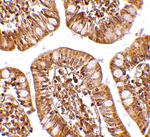Product Detail
Product NameZBP1 Antibody
Host SpeciesRabbit
ClonalityPolyclonal
PurificationAffinity chromatography purified via peptide column
ApplicationsELISA WB IHC
Species ReactivityHu Ms Rt
Immunogen TypePeptide
Immunogen DescRaised against a 18 amino acid peptide from near the carboxy terminus of human ZBP1.
Target NameZBP1
ConjugateUnconjugated
Other NamesZ-DNA binding protein 1, DLM-1, DAI
Accession NoSwiss-Prot:Q9H171
Gene ID:81030
Uniprot
Q9H171
Gene ID
81030;
Concentration1mg/ml
FormulationSupplied in PBS containing 0.02% sodium azide.
StorageCan be stored at -20˚C, stable for one year. As with all antibodies care should be taken to avoid repeated freeze thaw cycles. Antibodies should not be exposed to prolonged high temperatures.
Application Details
Western blot analysis of ZBP1 in mouse small intestine tissue lysate with ZBP1 antibody at (A) 0.5, (B) 1 and (C) 2 ug/mL.
Immunohistochemistry of ZBP1 in human small intestine tissue with ZBP1 antibody at 2.5 ug/mL.
Z-DNA binding protein 1 (ZBP1) belongs to a family of proteins that contain the Zalpha domain which binds specifically to left-handed Z-DNA and Z-RNA. ZBP1 was initially identified as a novel gene that was up-regulated in activated macrophages in mice bearing ascites tumors, suggesting that is may play a role in processes such as host response in neoplasia. More recent reports indicate that the cytosolic ZBP1 has can act like the toll-like receptor TLR9 by detecting cytosolic double-stranded (ds) DNA and trigger induction of type I interferon and other innate immune responses. It is thought that the binding of ZBP1 to dsDNA enhances its association with innate immune response proteins such as the IRF3 transcription factor and the serine/threonine kinase TBK1 (also known as NAK). Multiple isoforms of ZBP1 are known to exist.
If you have published an article using product 24608, please notify us so that we can cite your literature.
et al,Inhibition of DAI refrains dendritic cells from maturation and prolongs murine islet and skin allograft survivalIn Front ImmunolOn2023 May 18byPengrui Cheng , Qian Jian et al..PMID:37197662
, (2023),
PMID:
37197662
et al,In vivo and in vitro study on the regulatory mechanism of XiaoChaiHu decoction on PANoptosis in sepsis-induced cardiomyopathy.
, (2025),
PMID:
39197800




 Yes
Yes



